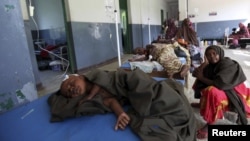DAKAR, Senegal - The medical aid group, Doctors Without Borders, has vaccinated more than 100,000 people against cholera in Guinea. The group says this is the first intervention of its kind in Africa, where people were vaccinated during a major cholera outbreak. Experts say that while the vaccine is a vital tool, it cannot be seen as a solution in itself.
Along with local health workers, Doctors Without Borders - known by its French acronym MSF - just wrapped up a campaign providing the two-dose oral vaccine to 117,000 people in Guinea’s Boffa region, about 150 kilometers north of the capital, Conakry.
MSF intervened with the vaccine following an outbreak in the region - the first time people in Africa are receiving protection during a cholera epidemic. MSF says the campaign could lead to a more effective response to outbreaks worldwide.
François Verhoustraeten, who is program director with MSF in Geneva and oversees the agency’s work in Guinea, said what’s particular about the Guinea intervention is that MSF introduced the vaccine once cases were already reported. So not only is the group protecting people from the disease, he said, it is also able to see the impact of vaccination on an ongoing epidemic.
Guinea and other West African countries regularly face outbreaks of cholera, a deadly illness caused by ingestion of food or water contaminated with the cholera bacteria. Once someone is infected, the bacteria are present in feces for one to two weeks, so proper sanitation and access to clean drinking water are indispensable for prevention.
MSF points out that the cholera vaccine cannot be used alone, but rather is just one tool against this highly contagious yet preventable disease.
Verhoustraeten said the agency will not base future cholera prevention efforts on the vaccine. He said proper hygiene and access to clean water remain fundamental measures and that the vaccine can be a significant addition.
MSF and local health workers carried out the campaign in Guinea's Boffa region between late April and mid-May. The agency says the vaccine is relatively easy to administer, training for local health workers is basic, and the vaccine has been well accepted by the people.
Claire-Lise Chaignat is a cholera expert at the World Health Organization in Geneva. She said WHO is closely watching the campaign in Guinea.
“Vaccines have certainly a role to play in cholera control, but it’s not a panacea. We’re very keen on seeing how this intervention of MSF in West Africa is going to be effective,” said Chaignat.
She said vaccination is becoming increasingly prominent in cholera prevention, pointing to a project in Zanzibar, in eastern Africa, where broad vaccination campaigns are planned.
“Now the recommendation is to use cholera vaccines to eliminate cholera in Zanzibar by having three vaccination rounds over a period of 10 years, along with improved water and sanitation. So you see the vaccine is really coming to the forefront, but again not as a sole measure; it has to be part of an intervention package,” said Chaignat.
MSF points out that a number of other diarrheal diseases affect people in Africa - all the more reason proper sanitation and clean water are paramount.
Along with local health workers, Doctors Without Borders - known by its French acronym MSF - just wrapped up a campaign providing the two-dose oral vaccine to 117,000 people in Guinea’s Boffa region, about 150 kilometers north of the capital, Conakry.
MSF intervened with the vaccine following an outbreak in the region - the first time people in Africa are receiving protection during a cholera epidemic. MSF says the campaign could lead to a more effective response to outbreaks worldwide.
François Verhoustraeten, who is program director with MSF in Geneva and oversees the agency’s work in Guinea, said what’s particular about the Guinea intervention is that MSF introduced the vaccine once cases were already reported. So not only is the group protecting people from the disease, he said, it is also able to see the impact of vaccination on an ongoing epidemic.
Guinea and other West African countries regularly face outbreaks of cholera, a deadly illness caused by ingestion of food or water contaminated with the cholera bacteria. Once someone is infected, the bacteria are present in feces for one to two weeks, so proper sanitation and access to clean drinking water are indispensable for prevention.
MSF points out that the cholera vaccine cannot be used alone, but rather is just one tool against this highly contagious yet preventable disease.
Verhoustraeten said the agency will not base future cholera prevention efforts on the vaccine. He said proper hygiene and access to clean water remain fundamental measures and that the vaccine can be a significant addition.
MSF and local health workers carried out the campaign in Guinea's Boffa region between late April and mid-May. The agency says the vaccine is relatively easy to administer, training for local health workers is basic, and the vaccine has been well accepted by the people.
Claire-Lise Chaignat is a cholera expert at the World Health Organization in Geneva. She said WHO is closely watching the campaign in Guinea.
“Vaccines have certainly a role to play in cholera control, but it’s not a panacea. We’re very keen on seeing how this intervention of MSF in West Africa is going to be effective,” said Chaignat.
She said vaccination is becoming increasingly prominent in cholera prevention, pointing to a project in Zanzibar, in eastern Africa, where broad vaccination campaigns are planned.
“Now the recommendation is to use cholera vaccines to eliminate cholera in Zanzibar by having three vaccination rounds over a period of 10 years, along with improved water and sanitation. So you see the vaccine is really coming to the forefront, but again not as a sole measure; it has to be part of an intervention package,” said Chaignat.
MSF points out that a number of other diarrheal diseases affect people in Africa - all the more reason proper sanitation and clean water are paramount.












